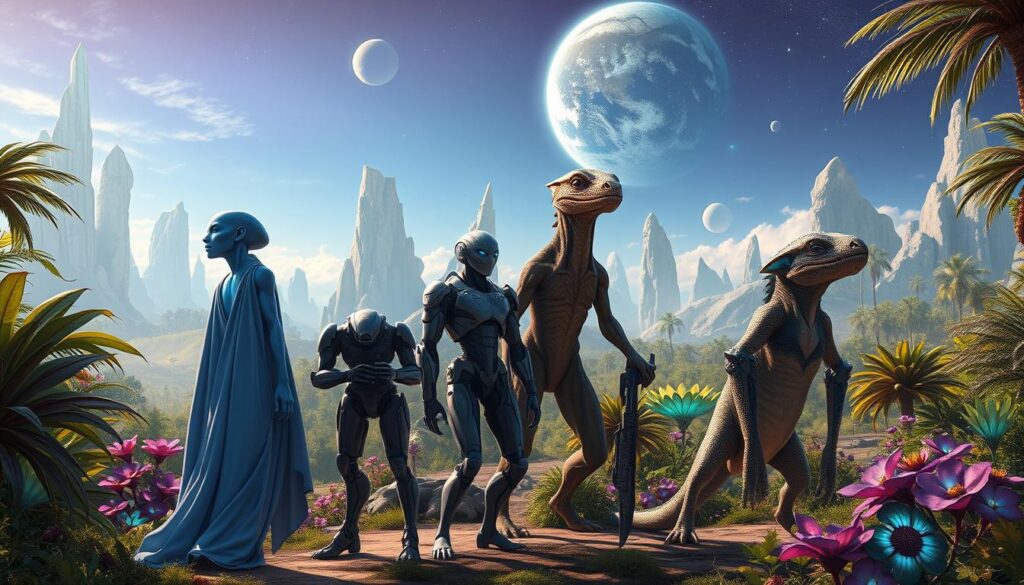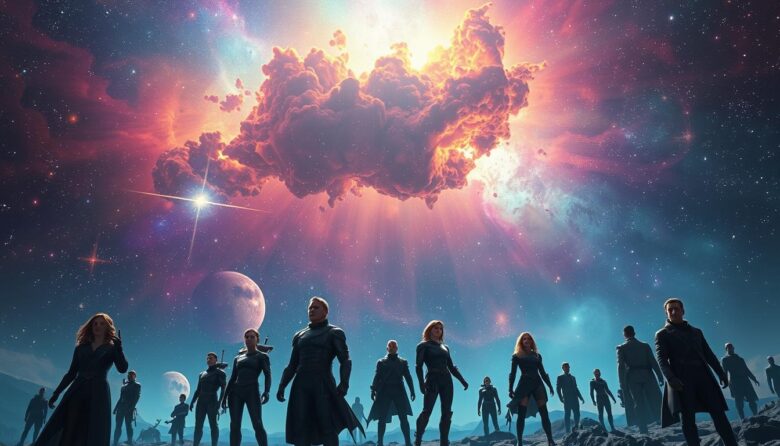When we gaze up at the night sky, we often ask: Do we really belong here? The sparkle of distant stars makes us curious about other worlds. Stories of sci-fi characters, like E.T. or ’s heroes, show how alienation and exploration spark our imagination. What if life exists elsewhere? These questions mix wonder with a search for meaning.
Key Takeaways
- Stargazing connects us to ancient and modern questions about our place in the universe.
- Sci-fi characters reflect human fears and hopes about encountering the unknown.
- Stories of alienation in films like ’s “Arrival” challenge how we view “otherness.”
- Discovering other worlds could redefine what it means to belong.
- Curiosity about alien life ties our identity to cosmic exploration.
Exploring The Allure of Other Worlds: Why We Dream of the Stars
Humans have always looked up at the stars, wondering what’s out there. This curiosity is more than just a question—it’s a deep desire to connect with the unknown. Sci-fi stories capture this longing, mixing imagination with science.

The Origins of Our Cosmic Fascination
From ancient myths to today, humans have been drawn to the sky. Stories like 2001: A Space Odyssey and Arrival explore the idea of extraterrestrial beings. They let us ponder big questions in a safe way.
Science Fiction Portrayal & Extraterrestrial Beings
Creators use extraterrestrial beings to reflect human traits. For instance:
- Aliens in Star Trek show cultural diplomacy
- The loneliness in E.T. mirrors feeling out of place
These sci-fi stories make the unknown a mirror for our society.
Imagination, Innovation, and the Dream of the Unknown
Innovation often draws from sci-fi ideas. NASA’s Artemis program, for example, was inspired by old novels. This shows how stories can drive progress.
Our fascination with the stars is more than just a dream. It’s a search for our place in the universe. Whether through science fiction portrayal or space missions, we seek answers to our existence.
Sci-Fi Characters and the Alien Experience on Earth
Sci-fi stories often show how characters from other worlds face challenges on Earth. This mix—why sci-fi characters often feel alien on earth—brings up deeper themes about belonging in sci-fi. Their struggles reflect human questions about who we are and if we’re accepted.

For these visitors, Earth is a new place to explore. It’s not just about seeing new sights—it’s a journey of self-discovery. Think about how a non-human character deals with human customs, language, or social norms. This clash isn’t just for show—it helps us see real issues like immigration or adapting to new cultures.
- Physical differences: Non-human traits draw attention, making characters stand out.
- Cultural barriers: Misunderstanding social rules creates tension.
- Existential purpose: Questioning their role in a world not their own.
| Character | Origin | Earth Experience |
|---|---|---|
| E.T. | Alien visitor | Forms a bond with a child, highlighting empathy over fear. |
| Agent K (Men in Black) | Human, but outsider in his own world | Struggles with loneliness despite his role as an enforcer. |
| Lara Croft (Tomb Raider) | Human explorer | Her adventures in ancient sites tie Earth’s history to personal growth. |
“To belong is to find a home in the unfamiliar.” — Imaginary quote reflecting sci-fi themes
These stories teach us that belonging in sci-fi is about connection, not just planets. Whether an alien or a human explorer, their tales ask: What makes a place feel like home? The answer often involves embracing curiosity and vulnerability.
Conclusion
Our curiosity about the universe has led to many stories about alien experiences. These tales, from far-off galaxies to our own planet, show our hopes and fears. They teach us that the “other” can make us think differently and grow.
Think about how movies like Arrival and books like The Three-Body Problem show our mix of wonder and fear. These aren’t just stories—they reflect our own humanity. Every time we meet the unknown, it changes how we see ourselves.
When you hear about a new planet or watch a sci-fi movie, think about what it says about us. The alien experience is more than just aliens. It helps us understand ourselves, our feelings, and the endless possibilities. Stay curious, keep asking questions, and remember: the universe’s secrets are waiting for those who dare to explore.



